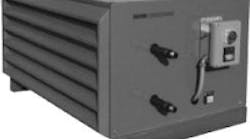Hydraulic fluid chillers serve as an alternative to air-or water-cooled heat exchangers — especially when ambient air is too hot to adequately cool hydraulic fluid or cooling water is inaccessible or impractical.
Another alternative is to specify an oil chiller — a refrigeration system that can maintain hydraulic fluid within a narrow temperature range regardless of the ambient temperature. A chiller uses a brazed-plate heat exchanger with hydraulic fluid on one side and refrigerant to flow on the other. The heat exchanger is designed to produce turbulent flow of the hydraulic fluid for maximum heat transfer to refrigerated plates. The refrigerant cools hydraulic oil rapidly and allows maintaining temperature to within ±0.5° F.
A familiar setup
As with conventional air-or water-cooled heat exchangers, chillers usually are incorporated into an off-line filtration (kidney) loop. In this setup, fluid is pumped from the hydraulic system's reservoir, through a filter, and into the chiller inlet. Upon entering the chiller, the fluid passes through a refrigeranttooil heat exchanger, where the oil is immediately chilled. Oil then flows from chiller outlet and returned to the reservoir.
As with any high-quality heat exchanger, intermixing of hydraulic fluid and the coolant from component failure is rare. However, if a failure should occur in a chiller, refrigerant oil, not water, will mix with the hydraulic oil. Follow-up maintenance would involve simply draining and replenishing the hydraulic fluid.
If desired, the temperature set point can be changed via an onboard digital control. The chiller will then cycle automatically to maintain the desired set point. The control will display the current oil temperature, desired oil temperature, and temperature differential.
Benefits of maintaining hydraulic-oil within a narrow temperature-range include lower maintenance costs, longer seal life, and more consistent hydraulic system operation, which can lead to higher repeatability.
This discussion was submitted by Chiller Mfg., Jeffersonville, Ind. For more information, call Carter Collins at (800) 334-2665 or visit www.chillermfg.com


